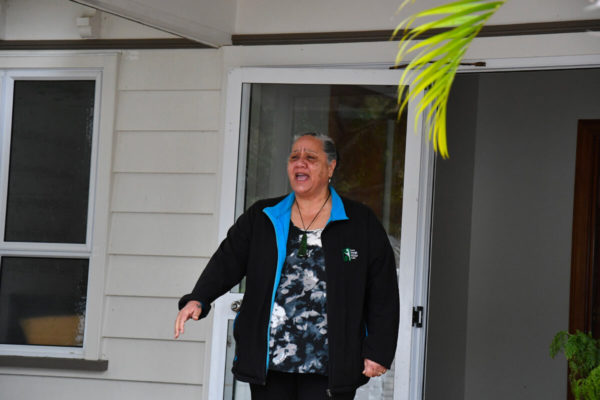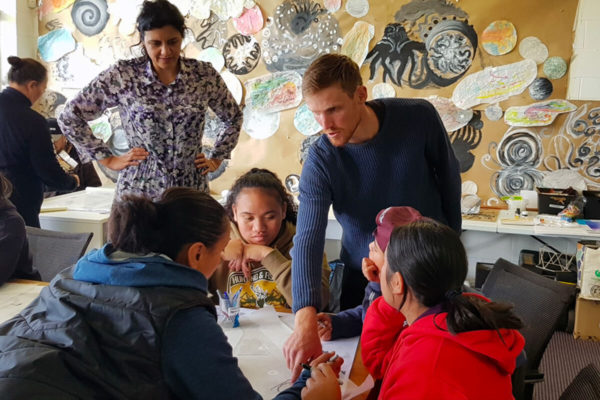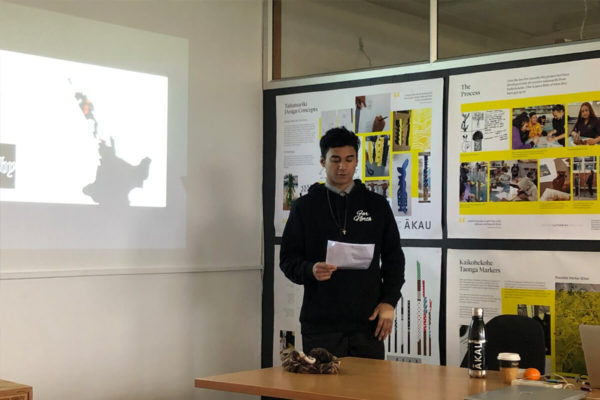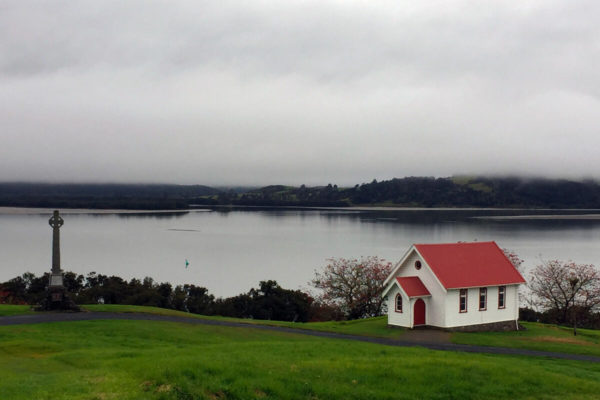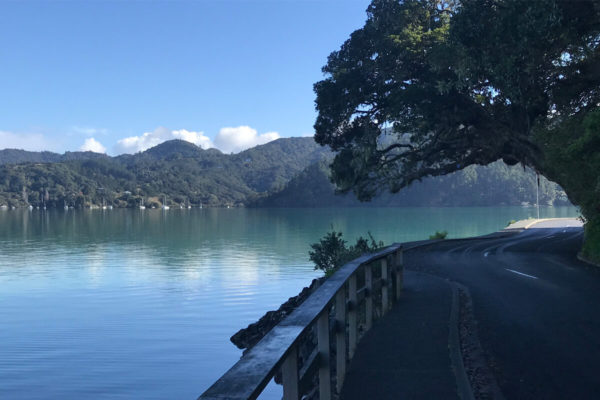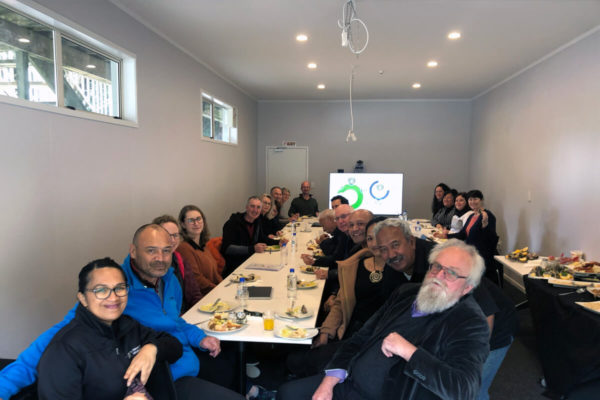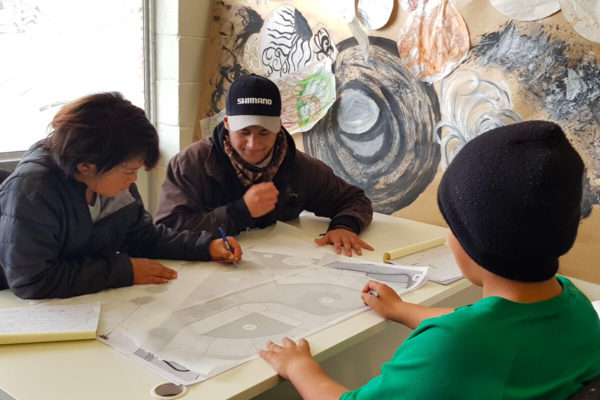Annual Report 2018/19

Stephen and Margaret Tindall
Founders — The Tindall Foundation

Message from the Founders
Hope and Opportunity for Te Tai Tokerau
Kia ora and welcome to our 2018/19 Annual Report. This year’s report focuses on our work in Northland/Te Tai Tokerau, a stunning place filled with wonderful people, vibrant communities and an abundance of aroha (love). We were lucky enough to visit the Hokianga and surrounding areas recently to meet some of the organisations with whom we are working.
Our activity in Northland has focused on supporting seven iwi leaders (known as the Amokura Iwi Consortium) to implement their economic development plan for the holistic wellbeing of the region. With our support, Amokura has identified a number of impact investment opportunities that will have positive outcomes for Te Tai Tokerau. We are excited to be embarking on this journey together to see economic growth that will revitalise communities and offer job opportunities, more housing, forest regeneration, renewable energy and affordable digital connectivity.
Our giving has always been built on high-trust relationships. While our relationships with Māori communities in Northland have been positive, they have often been at a project or organisational level rather than at a system level.
Now we are implementing a strategy that is outcomes driven, working from a place of aspiration rather than deprivation. When searching for and reflecting on opportunities in Northland, we are doing this through the lens of Māori self-determination, giving whānau, hapū and iwi the chance to lead the change they want to see in their own communities. We know that Māori already hold many of the solutions: we are just helping them to fulfil these and are walking behind them to offer support.
It is an exciting time as we begin a journey together. We are honoured to be working with amazing people, dedicated to their communities and whenua (land). We see first-hand the abundance of talent and capability in the Te Tai Tokerau community.
In this Annual Report we share stories of some of our partner organisations and projects in Northland. There is much to be celebrated — talent, generosity and aroha. Positive change is gaining momentum and we believe this region will have a brighter future.
Enjoy reading our Annual Report and all the best for a happy and healthy 2020.

Cyril Howard
Regional Development Manager — The Tindall Foundation
The Beginning of a Journey…
Cyril Howard joined The Tindall Foundation (TTF) as Regional Development Manager in June 2018 and since then has been working to investigate opportunities and form relationships with iwi and communities in the East Coast and Northland. Highly respected in the philanthropic sector, Cyril has helped TTF to embark on the journey of partnering more effectively with Māori.
We asked Cyril to explain the steps taken on the journey so far.
How did our work in Northland begin?
Since 2017 The Tindall Foundation has built a relationship with Amokura, a consortium of chief executives (CEs) from seven Northland iwi. We originally came together to listen and learn about the Māori economic development plan He Tangata, He Whenua, He Oranga, which Amokura had developed for Northland. Iwi had identified areas that could make a significant difference to economic growth and the overall wellbeing of people in the region.
Early on, the CEs were keen to learn how impact investment could make the economic plan a reality. Together, friends of TTF from the impact investment world, the CEs and TTF staff and Trustees embarked on a brainstorming session and ongoing conversations to identify how and what investments could make a difference to the region.
The relationship that formed was one of high trust, and it has continued to grow. Rangimarie Price, CEO of Amokura, and Ian Short, consultant to Transforming Taitokerau for Good, are developing projects in the areas of revitalised communities (housing, solar energy and affordable connectivity), regenerative forestry, agriculture and aquaculture, and preparing for investment. These current and long-term initiatives are Māori led and will ultimately support an economy in Te Tai Taitokerau that has tangata whenua at the forefront.
Relationship building has been key to working with Māori in the North. Why are relationships so important to Māori?
For Māori, whakapapa (genealogy) and interconnected relationships underpin the way we see the world. Building trusting relationships is a journey and won’t happen overnight. It’s more about us as an organisation being trusted in the relationship with the communities we serve: having shared outcomes and values, acting with integrity and humility, and speaking the truth. But the most important thing to building a trusting relationship is to listen, listen and listen more.
Tika, pono, aroha — these words are hard to translate into English, but they encompass the notions of fairness, truth, justice, honesty, integrity, compassion and empathy. Taking care of each other’s emotional, mental, physical and spiritual wellbeing on this journey will ultimately build an enduring and reciprocal relationship.
How will this work benefit Māori and the community?
Supporting Māori economic development and the implementation of the He Tangata, He Whenua, He Oranga plan enables Māori to take control of their own destiny. Moving away from a place of grievance to one of hope and prosperity allows people to dream big.
We hope to provide opportunities to enhance the mana of all people of Te Tai Tokerau, because what is good for Māori is good for the community. Moving the next generation into a world of opportunity and sustainable employment, where regenerative forestry, agriculture and aquaculture are sustained through kaitiakitanga (custodianship), will help communities to be vibrant and thriving, with access to warm, comfortable housing.

TTF Visits Northland
What an amazing few days we had as a staff and Trustee team in Northland in August 2019, visiting some of the organisations we support and learning from others about their work. Our team saw at first hand the outstanding work being done in the North, experienced the positive energy among the groups, and met the awesome people leading the charge.
At Te Rūnanga o Whaingaroa we heard about the affordable housing development in the pipeline with 20 houses planned in the next two to five years in Takou Bay. We saw the emergency housing facilities and social services the organisation provides for families. The Rūnanga then treated us to a delicious lunch of local seafood — Cyril appreciated a huge plate of oysters!
The team enjoyed a majestic night tour of Tāne Mahuta on the west coast. What a beautiful and spiritual experience! We also valued our time in the beautiful Waipoua Forest with the project team from Te Roroa iwi, seeing the significant progress they have made in eradicating weeds and restoring native trees over the last few years.
Reconnecting Northland, a long-term initiative that is unifying conservation efforts in the region, gave us a full update on their activities. Eamon Nathan, the programme’s Pou Manatū, filled us in on ambitious plans in pest management, riparian planting, kiwi conservation, freshwater wetland restoration, renewable energy, eco-tourism and more.
Then it was on to hear about the Manea Footprints of Kupe Cultural Centre in Opononi. This fantastic new attraction and education centre will bring in tourists and provide economic and social impact for the local community. We are delighted to be funding the carving of 16 pou (posts) and a bespoke Māori tourism-training programme for young people.
Further up the Hokianga Harbour we visited the historic Māngungu Mission House and learned about the largest single signing of Te Tiriti o Waitangi/The Treaty of Waitangi, by 70 chiefs here on 12 February 1840. The house overlooks the Hokianga Harbour and the mission cemetery.
In Kaikohe, Deidre Otene and taitamariki (young people) at Te Kotahitanga e Mahi Kaha Trust showed us their propagation house and native tree planting. We heard their inspiring stories of overcoming adversity and the opportunities the trust is providing for intergenerational change. The lamb on the spit, prepared by the young people, was a highlight!

At ĀKAU we were impressed by the creative minds of young people who presented their artistic vision for Kaikohe and architectural solutions that will reduce the effects of climate change on the built environment.
The Twin Coast Cycle Trail, which runs from Opua to Māngungu Mission House, was also impressive. This trail is already helping to stimulate tourism in Kaikohe and the Hokianga, and we heard about plans to expand its potential to grow local business and creative industries.
All in all this was a very memorable trip, and we are grateful to everyone who hosted us so warmly and shared their stories and ambitions.
Te Ahurea Māori Learning
In March 2018 TTF staff and Trustees began learning te Reo and tikanga Māori with the help and guidance of Rāniera (Rā) Winikerei. Rā has helped give us confidence to engage in a culturally appropriate way, increasing our knowledge of the language, protocols, history and customs of Te Ao Māori (The Māori World). We had great fun in the classes, with many interesting discussions and lots of laughs.

Rā explains:
What have you been teaching the TTF team over the last 14 months?
The goal was to be practical and relevant, so we broke up sessions into 12 themes covering tikanga (customs) and kawa (protocol), the marae, pepeha and so on. All were aimed at improving TTF’s engagement and relationship with Māori.
What have they learned?
Over the past 14 months the team has learnt about a number of aspects of te ahurea Māori: from karakia to a basic introduction, tikanga and kawa, pōwhiri and whakatau, whakataukī and kīwaha, tangihanga and Matariki, tribal structures and kaupapa Māori — and much more.
What relationship was formed through the time you spent together?
Right from the start my aim was to create a safe, fun learning environment, a space where anything could be discussed without judgement or ridicule. To TTF’s credit, this aim was achieved relatively quickly: everyone was open and honest, but above all showed a genuine desire to learn more about Te Ao Māori.
Why do you think it is important for organisations to learn te Reo and tikanga?
I believe it is incredibly important for all New Zealanders to learn basic te Reo and tikanga Māori. By learning a language you gain a higher understanding and a deeper appreciation of that culture; in other words, when learning te Reo, we in fact learn more about ourselves as New Zealanders.
How do you think learning te Reo and tikanga will help prepare the TTF team for working more closely with Māori?
TTF now has the tools and knowledge to engage with Māori in a respectful manner, while observing the appropriate tikanga and kawa.

Kia Ora from John
This past year has been one of exciting change for the Foundation. We welcomed two new staff members, a new Trustee, and a baby girl to the Tindall whānau.
Earlier this year we launched a new-look website and a refreshed strategy. We have changed our thinking around the way we give donations, moving away from categories of funding towards a greater focus on the positive outcomes we are hoping to achieve.
As a result, we have simplified and refined our direction to gain greater coherence and scope, while remaining committed to the causes close to the Foundation’s heart. An important part of this is the more connected way in which we are supporting organisations in Te Tai Tokerau and Māori-led approaches.
Our giving focuses on three areas — Family/Whānau, Community and Environment. This is not a big departure from how we have given donations in the past or whom we have given to, but it allows for greater flexibility and responsiveness to new and emerging areas of need. Across these three areas we are particularly focusing on initiatives that address long-term, intergenerational and systemic change.
In Te Tai Tokerau, our previous ways of working have not made as much of a difference as hoped. Many individuals and organisations have done fantastic work, yet Northland still has high rates of intergenerational disadvantage, especially for Māori. So we are taking more of a systemic, investment approach: stepping back, listening, forming trusted relationships, and investing in long-term, Māori-led economic development.
We’ve also spent time preparing ourselves for how we might work together more usefully with Māori. A key part of that preparation has been the guidance and teaching provided by Rāniera Winikerei in our te ahurea (Māori culture) sessions, for which we are all extremely grateful. We’ve learned a lot — that relationships come long before funding, that knowing our history is critical, that communities must trust and believe in us first, and that shared values are at the heart of what we do together and enable the work to happen.
Thanks to everyone with whom we have worked over the past year.
Ngā mihi nui.

John McCarthy
Manager — The Tindall Foundation

2018/19
Donation Highlights
Click and drag to see more
2018/19 Significant Donations
Click and drag to see more
Total Donations 2018/19
10,115,536
Our Giving
In the 2018/19 year:
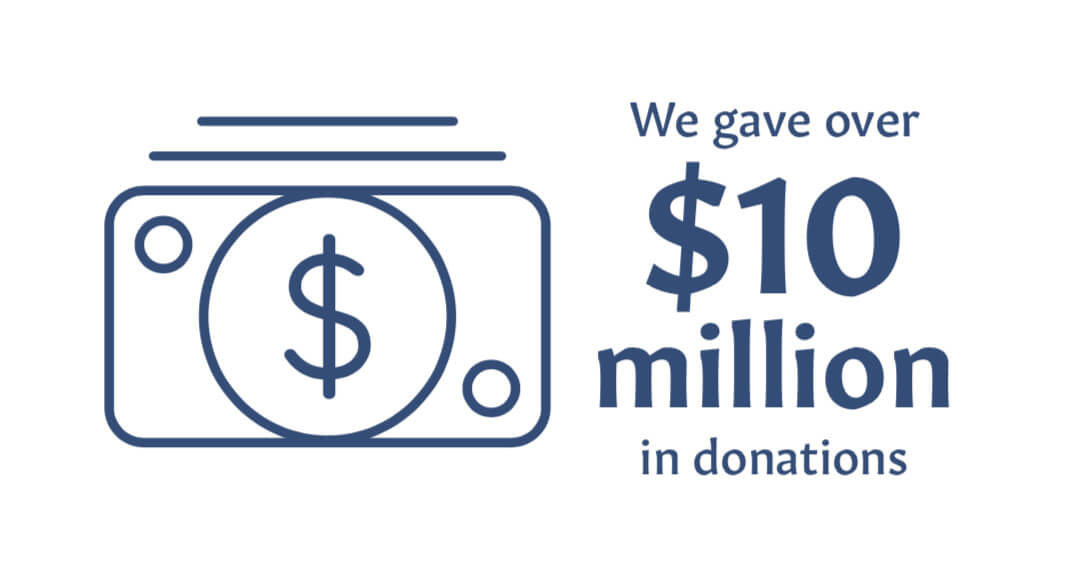
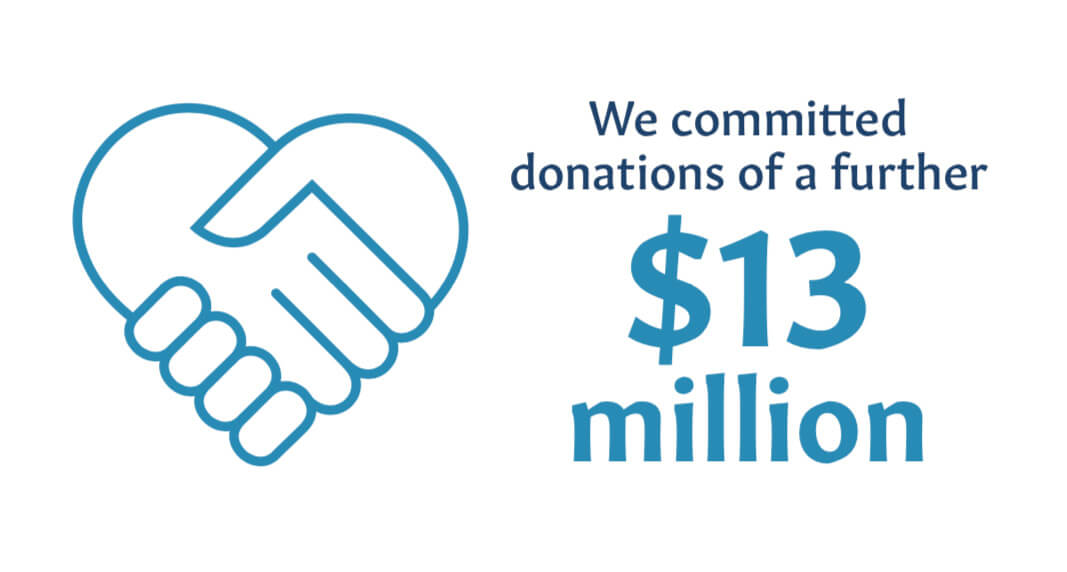
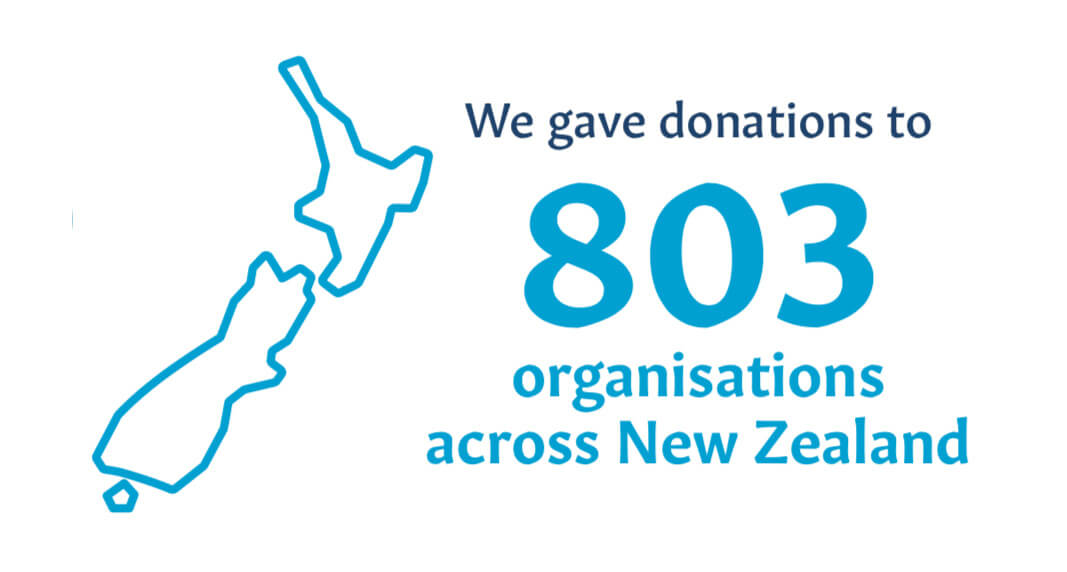
In the last 24 years:


Headline Summary of Key Cumulative
Results (1995–2019)
| 1. Gross Dividends Received Less Prepaid Tax (Imputation Credits) Net Dividends Received | $428,669,050 ($134,591,509) $294,077,541 |
| 2. Donations Paid (1995–2019) | $174,383,246 |
| 3. Administration and Operating Expenses (7.2% of Donations Paid) | $12,500,366 |
Assets
| Liquid Assets as at 31 March 2019 | $100,018,943 |
| The Warehouse Group Limited — Shares | $161,146,680 |
| Other Assets | $36,235,460 |
| Total Assets | $297,401,083 |
Total Donations Committed
For the 2018/19 financial year, The Tindall Foundation paid out or committed to donations totalling $23,662,977. During the year we gave donations to 803 organisations across New Zealand.
$10,115,536

$13,547,441
Total Donations Paid
in 2018/19 by Focus Area

Local Donation Managers: $3,033,007
TTF Direct Donations: $2,054,785
Total Donations:
5,087,792

Local Donation Managers: $242,892
TTF Direct Donations: $1,351,452
Total Donations:
1,594,344

Total Donations:
2,587,599

Total Donations:
845,801
Our People
The Tindall Foundation is a private philanthropic family foundation working throughout Aotearoa/New Zealand. We are helping to build a stronger, sustainable nation so that families, communities and our environment thrive now and in the future. Our work is driven by a belief that all Kiwis should have the chance to achieve their full potential and contribute to a healthy, strong society.
We recognise the strength of whānau/families and communities and the importance of our natural environment. We contribute to organisations and community groups through donations, social loans and social investments, and in non-financial ways through advocacy, influencing, convening, connecting and capacity building. We appreciate the diverse needs of communities, and so aim to be a flexible and responsive funder.
Governance

Our governance team consists of our Founders, Margaret and Stephen Tindall, their son Robbie (left), and two independent Trustees, Rukumoana Schaafhausen (Ngāti Hauā, Waikato Tainui) in the centre and Jennifer Casey (right).
Staff

We are lucky to have a fantastic management team made up of full-time and part-time staff and a part-time volunteer: (from left to right) Cyril Howard, Martina O’Driscoll, Jennifer Reid, Anne Tindall, Liz Tindall Tetro, Kate Holgate, Ashlee McCormick, John McCarthy.
Key Consultants/Advisers
- Trevor Gray
- Bede Martin (Interact Canterbury)
- Glenn and Sharyn Cant
- Margot Nicholson (NFP Works)
- Ian Short
- Rangimarie Price
- Annette Lees & Associates
Financial Advisers
- BDO Auckland
Auditors
- RSM Hayes Audit
Legal Advisers
- Chapman Tripp
- Grove Darlow & Partners
Bank
- BNZ Bank
Acknowledgements
Editorial Content and
Production Management
- Elizabeth Tindall Tetro
Editors
- Oratia Media
Art Direction and Design
- Mantis Digital
- Dean Whitehead
Creative Contributors,
Photography and Film
- Whitehead HD
- Debbie Beadle
- Emily Raftery
- Jan van Vliet
- Lloyd Latimer

